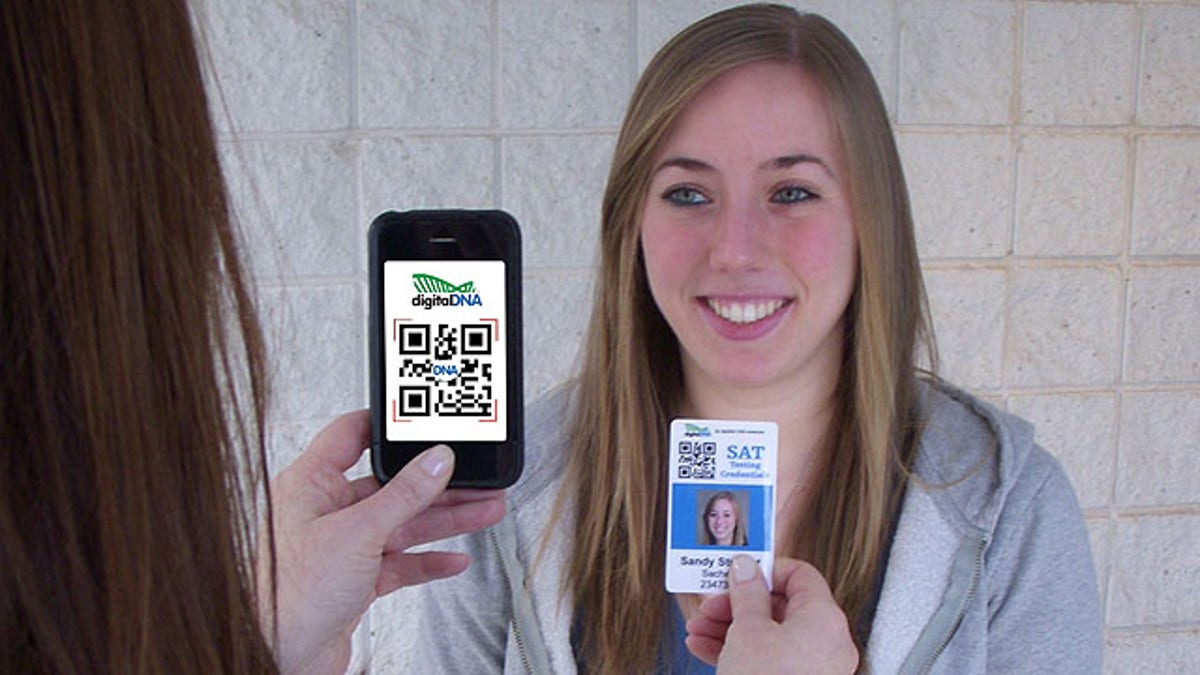
Once embedded into the card, Heyward said the "digital DNA" is then scanned using a smartphone and sent wirelessly to a secure database in a private cloud. (Applied DNA Sciences)
Talk about turning over a new leaf in the classroom.
As New York lawmakers consider a bill that would make cheating on the SAT college entrance exam a felony, one company thinks the answer to thwarting testing fraud can be found in molecules of plant DNA embedded into a secure identification card.
Dr. James Hayward, president and CEO of Long Island-based Applied DNA Sciences, Inc., said the "absolutely unbreakable" system features a counterfeit-proof identification card that uses molecules of plant DNA segments to authenticate a student's identity.
That identification card -- combining the embedded DNA info with an authentic photograph of the student -- forms a one-two identity verification that's impossible to fake or borrow, he said.
"We start with the whole genome of a plant and it doesn't matter which one," Hayward told FoxNews.com on Wednesday. "Plants are a great choice because they have quite complex DNA, in some cases as complex or more complex than humans and they also have systems that enable them to endure stressors we don't normally expose humans to."
Once embedded into the card, Hayward said the "digital DNA" is then scanned using a smartphone and sent wirelessly to a secure database in a private cloud.
"We're capable of designing, in effect, an infinite number of markers, and we're able to embed those markers and encrypt it into a variety of media," he said. "It eliminates the potential for electronics to be counterfeited. In order to crack our DNA sequence, you'd have to know the sequence and that cannot be uncovered from the marker itself."
The cost of the program would be "pennies per card," Hayward said, and would ultimately be based on the number of authentications used by school officials.
"This is a very affordable approach and it's one we think will become widespread as a consequence," he said. "And the beauty of DNA is that it would elevate any rapid screening to a forensic-level identification method that would [be upheld] in court."
Hayward touted the technology during a hearing on Tuesday before the New York Senate Higher Education Committee. He said the public company, which is closely affiliated with Stony Brook University's Center for Excellence in Wireless & Information Technology, is now in early discussions with officials at the Educational Testing Service (ETS) and The College Board, which administers the SAT.
Tuesday's hearing was prompted by a scandal in New York's Nassau County in September involving 20 people accused of a cheating scheme in which impostors were allegedly paid up to $3,600 to take tests in place of high school students. All students accused in the ring have pleaded not guilty and are due to appear in court next month.
Meanwhile, state Sen. Kenneth LaValle, chairman of the New York Senate Higher Education Committee, has proposed legislation that would create new felonies of facilitation of education testing fraud, of scheming to defraud educational testing and create a new misdemeanor of forgery of a test. His bill also calls for potential test security measures including fingerprinting and retinal scans.
Drew Biondo, a spokesman for LaValle, said the lawmaker wants to bring "21st century solutions" to solve the problem. The successful new system, he said, might utilize biometrics or perhaps botanical DNA like the proposal submitted by Applied DNA Sciences.
"Right now, anyone with a picture ID can take a test," Biondo said Wednesday. "And anyone with a computer can forge a school ID."
In October, the College Board hired Freeh Group International Solutions to investigate its security measures. The firm, which is headed by former FBI Director Louis Freeh, declined to comment to FoxNews.com on Wednesday when asked when its review and recommendations will be submitted.
Prior to Tuesday's hearing, ETS spokesman Tom Ewing said in a statement to FoxNews.com that the organization remains "open to all ideas" regarding test fraud.
"ETS and The College Board have heard from a number of organizations offering unique technological solutions to address the test impersonation issue," Ewing wrote in an email. "While many of these solutions have been interesting, none have managed to eliminate impersonations without unduly disrupting test day, raising privacy concerns, or unduly adding to the operational burden of cost of the SAT Program. While we remain open to all ideas, we are focused on designing a solution utilizing technologies readily available to us to address this issue."
Tom Rudin, The College Board's senior vice president for advocacy, government relations and development, told LaValle and other senators during Tuesday's hearing that cheating schemes like the one uncovered in New York are rare and only a "handful" of cases are referred to law enforcement. Most of the time, he said, cheating is handled by eliminating the offender's grade.
"In the end, it is the responsibility of local enforcement to take action," Rudin said. "Again, we are deeply committed to working with local law enforcement."
Rudin also said the organization is "close" to designing a solution to address issues regarding test-taking impersonation, but declined to speak about them publicly until they have been validated by the Freeh Group.
"However, I can assure you that the solution will be a part of the final report of the Freeh Group, which we will be happy to share with this committee, and we are working diligently toward implementing the solution in the 2012-2013 testing year," Rudin said according to testimony.
The Associated Press contributed to this report.




















